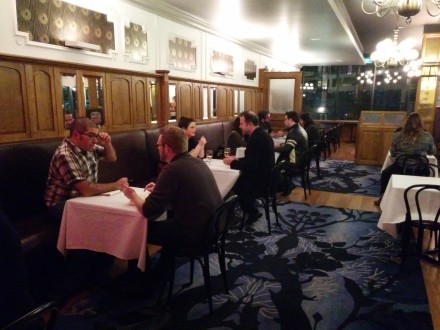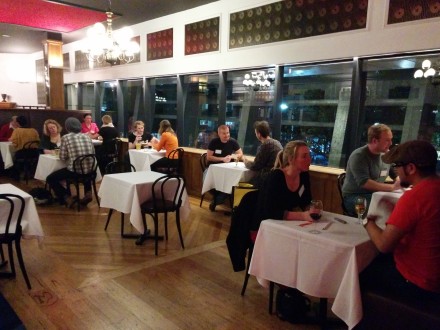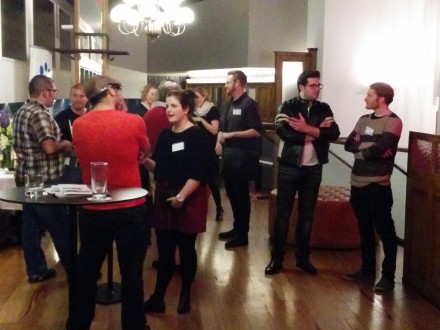Thanks to Sarah Lau for the award announcement round up.
Recently, we celebrated the best and brightest of Australian Science Communication at the Unsung Hero award presentation ceremony in Sydney.
The ASC created the Unsung Hero award to honour a person or group who exemplifies science communication and who has not yet received significant recognition for their contributions.
Frankie Lee was crowned as the 2014 winner, in recognition of her diverse, creative and wide-reaching efforts in science communication across the country.
Frankie has worked tirelessly to engage audiences in science by managing varied and unusual science communication projects in Sydney and around Australia. She was recognised for her work in developing the careers of emerging science communicators through connecting them with events and media opportunities.
Whilst Frankie has been instrumental in many of Australia’s highest profile science communication programs, her work is nearly always behind the scenes – facilitating, coordinating and mentoring. It was for this reason that the panel considered Frankie to be the definition of ‘unsung’ in creating and promoting excellent science communication in Australia.
Frankie’s full citation from the judging panel and ASC President, Associate Professor Joan Leach, is included below.
The judging panel was impressed with the calibre of nominations and also selected two highly commended finalists for recognition – Dr Shane Huntington, from the University of Melbourne and broadcaster on 3RRR’s Einstein-a-Go-Go program and Jeannie-Marie LeRoi from the University of Tasmania.
Shane is a true all-rounder in science communication, whether exploring science via radio interviews, implementing science outreach programs with schools or developing partnerships to support scientific research. Shane’s dedication to quality science communication, coupled with his community spirit, is evident in the quality of his work and the extent of his contributions.
27 years, Jeannie-Marie has initiated, developed, co-ordinated and supported a diversity of education and engagement programs. These have spanned student programs, community engagement, government relations, teacher professional learning and science-arts collaborations. Jeannie-Marie’s work has been extensive and she has made an extraordinary contribution within Tasmania and across Australia.
UNSUNG HERO OF AUSTRALIAN SCIENCE COMMUNICATION WINNER
FRANKIE LEE
FRANKIE LEE is honoured as the 2014 Unsung Hero of Australian Science Communication for her significant contribution to science promotion.
Frankie has worked tirelessly to engage audiences in science by managing varied and unusual science communication projects in Sydney and around Australia. She is also recognised for her work in developing the careers of emerging science communicators through connecting them with events and media opportunities.
As a project manager across a number of science communication projects, Frankie is creative and sets up science communication in unusual settings, ranging from the Woodford folk festival to online ‘weather detectives’.
Frankie’s ability to monitor trends in science and seek opportunities for effective science communication is reflected in her involvement with the ‘I F***ing Love Science Live’ and ‘Science Alert – Space Oddity’ events. In both instances, Frankie worked tirelessly to secure interesting local and international talent, creating successful events that achieved significant attendance and media coverage. Frankie has played a huge part in bringing science to the forefront in Australia and ‘making science cool’ for different and unexpected audiences.
During her time with the ABC, Frankie was the driving powerhouse behind the ABC’s successful science outreach programs. She worked with scientists, broadcaster and ABC staff to produce creative science programs which highlighted the work of the scientists involved, engaged high school students and promoted a range of science events.
Frankie is a founding member of the Ultimo Science Festival (a partnership between Powerhouse Museum, ABC, University of Technology Sydney and TAFE Ultimo) and project manages many of the events as part of the festival, having been involved since its creation in 2006. Frankie has also project managed Science in the Pub across Australia, contributed to the genre of science comedy with the Science Comedy night at Ultimo Science Festival and the series of “That’ll Learn You” at Giant Dwarf Theatre, Redfern in late 2014.
Frankie works with many well-known as well as new science communicators to produce events on radio, television and live events. Frankie puts science communicators in the spotlight while staying behind the scenes. She is the brain behind the operation, curating inspiring and engaging science events and bringing science communicators to the forefront. She makes science communicators shine by ensuring that they are taken care of and that events run without a glitch.
Over the course of her extensive and diverse career, Frankie has made many significant contributions, but nearly always behind the scenes. It is for this reason the panel considers Frankie to be the definition of ‘unsung’ in creating and promoting excellent science communication in Australia.
Associate Professor Joan Leach
President, Australian Science Communicators
UNSUNG HERO OF AUSTRALIAN SCIENCE COMMUNICATION HIGHLY COMMENDED FINALIST
JEANNIE-MARIE LEROI
JEANNIE-MARIE LEROI is recognised as a highly commended finalist in the 2014 Unsung Hero of Australian Science Communication.
Over the last 27 years, Jeannie-Marie has initiated, developed, co-ordinated and supported a diversity of education and engagement programs. These have spanned student programs, community engagement, government relations, teacher professional learning and science-arts collaborations. Working primarily in Tasmania, Jeannie-Marie’s work has been extensive and she has made an extraordinary contribution across a wide range of activities.
Jeannie-Marie’s background in marine microalgal research has provided a strong scientific platform, whilst her creativity has contributed to new ways to inform and engage. Her commitment to improving community knowledge of local science research and career pathways has informed many successful programs and collaborations. She has excelled at pitching science communication activities, securing support and funding at the state and national levels.
In her current role managing marketing and engagement activities across the Faculty of Science, Engineering & Technology at UTAS, Jeannie-Marie works with internal and external partners on a range of mutually beneficial science education and engagement programs.
Under her leadership, Jeannie-Marie has helped develop the National Science Week program in Tasmania, expanding the number of events from 35 in 2001 to over 160 in 2013, with participation rates each year as the highest per capita of any state. Jeannie-Marie is currently the Chair of NSWk Tasmanian Co-ordinating Committee and member of the IA state partnerships with Questacon and DEDTA.
Jeannie-Marie initiated the Young Tassie Scientist program in 2003, which involves early career researchers in an interactive presentation program for Tasmania, focussing on regional and rural areas. This program has reached thousands of people in Tasmania and has helped the scientists share their work. She has also initiated and led a number of professional development programs for teachers, securing funding to establish targeted learning opportunities to support teacher skill development. These activities led to the establishment of the UTAS Graduate Certificate in Science Education in conjunction with the Faculty of Education.
Jeannie-Marie is committed to promoting the values of science as a career – and why we need scientists – challenging the commonly-held stereotype of scientists, and increasing the awareness of the importance of science in our society.
Associate Professor Joan Leach
President, Australian Science Communicators
UNSUNG HERO OF AUSTRALIAN SCIENCE COMMUNICATION HIGHLY COMMENDED FINALIST
DR SHANE HUNTINGTON
DR SHANE HUNTINGTON is recognised as a highly commended finalist in the 2014 Unsung Hero of Australian Science Communication.
Shane is a true all-rounder in science communication who works across a variety of media, a range of scientific fields, and targets a diverse range of audiences.
In his capacity broadcasting on 3RRR’s Einstein-a-Go-Go program, Shane has interviewed over 1000 scientists and communicated a variety of scientific concepts. Over the past 21 years, he has championed science, scrutinised bad science, and invited listeners into the discussion of where science is taking us.
As the Medicine, Science and Engineering host of Melbourne University’s Up Close podcast program, Shane hosted more than 1000 episodes, helping scientists and engineers tell their stories through in-depth interviews.
All of these activities are above and beyond Shane’s full-time role as Executive Officer (Strategy) to the Dean of the University of Melbourne’s Faculty of Medicine, Dentistry and Health Sciences. In this role, Shane advocates for researchers across the faculty, building important linkages with hospitals and other partner organisations and supports the development of the Faculty as a vibrant and successful research hub.
Along with Professor Rachel Webster, Shane founded, conceived and funded the Telescopes in Schools program, drawing on his background in physics and passion for astronomy. This program places research-grade telescopes into secondary schools in Melbourne. The schools targeted by the program are local government schools, predominantly in areas of socio-economic disadvantage. Through the program, students have access to a research-grade telescope, along with on-going training and outreach evenings that help to foster an interest in science at these schools. This program has now reached thousands of students.
Shane has also conducted communications training for hundreds of students and early career researchers over the last 10 years, and MCs numerous science communication events.
Shane’s dedication to quality science communication, coupled with his community spirit, is evident in the quality of his work and the extent of his contributions.
Associate Professor Joan Leach
President, Australian Science Communicators



